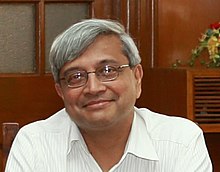
The Indian Institute of Science (IISc) is a public, deemed, research university for higher education and research in science, engineering, design, and management. It is located in the southern Indian city of Bangalore, Karnataka. The institute was established in 1909 with active support from Jamsetji Tata and thus is also locally known as the Tata Institute. It is ranked among the most prestigious academic institutions in India and has the highest citation-per-faculty among all the universities in the world. It was granted a deemed university status in 1958 and recognized as an Institute of Eminence in 2018.
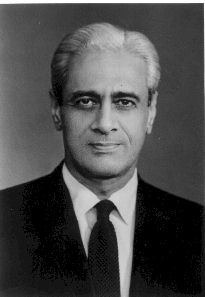
Satish Dhawan was an Indian mathematician and aerospace engineer, widely regarded as the father of experimental fluid dynamics research in India. Born in Srinagar, Dhawan was educated in India and further on in United States. Dhawan was one of the most eminent researchers in the field of turbulence and boundary layers, leading the successful and indigenous development of the Indian space programme. He succeeded M. G. K. Menon, as the third chairman of the Indian Space Research Organisation (ISRO) in 1972. The second launch pad of ISRO, Satish Dhawan space centre is named after him. He is greatly regarded as the man behind A. P. J. Abdul Kalam.

Chintamani Nagesa Ramachandra Rao,, is an Indian chemist who has worked mainly in solid-state and structural chemistry. He has honorary doctorates from 86 universities from around the world and has authored around 1,800 research publications and 56 books. He is described as a scientist who had won all possible awards in his field except the Nobel Prize.
M. R. N. Murthy, was a professor of molecular biophysics at the Indian Institute of Science, IISc, Bangalore. He currently teaches at the Institute of Bioinformatics and Applied Biotechnology, Bengaluru. His chief contributions are in the area of X-ray crystallography. He was awarded the Shanti Swarup Bhatnagar award for outstanding contribution to physical sciences, which is the highest honour for a scientist in India, in the year 1992.

The TIFR Centre for Applicable Mathematics is part of the School of Mathematics of the Tata Institute of Fundamental Research.
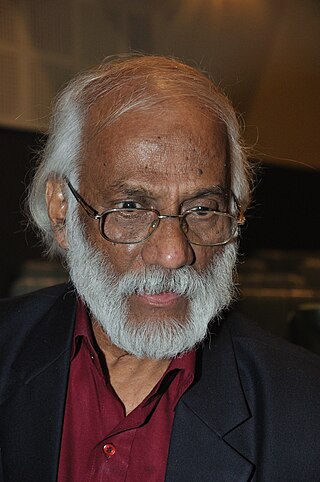
Govindarajan Padmanaban is an Indian biochemist and biotechnologist. He was the former director of the Indian Institute of Science (IISc), and presently serves as honorary professor in the department of biochemistry at IISc and Chancellor of Central University of Tamil Nadu.

Birla Institute of Technology & Science, Pilani - Dubai is a private technical research university and a constituent college of Dubai International Academic City. It became the international campus of BITS Pilani in 2000, making it the second campus established. It is the first Indian university to have an overseas campus. The institute is backed by the Aditya Birla Group and is one of the first six institutes to be awarded the Institute of Eminence status in 2018.

Rangachar Narayana Iyengar, also known as RNI, is a civil engineer and professor from India. He was with the Indian Institute of Science, Bangalore for about four decades. He has been the director of Central Building Research Institute, Roorkee (1994–2000). He is currently a Raja Ramanna Fellow, and the Director for the Center for Ancient History and Culture (CAHC) at the Jain University, Bangalore. He also setup the Center for Disaster Mitigation (CDM) at the Jain University. He has in the past been the editor of 'SADHANA' published by the Indian Academy of Sciences, Bangalore. Apart from his contributions to Engineering, he is also widely recognized for his work in History of Science.

Manchanahalli Rangaswamy Satyanarayana Rao was an Indian scientist. He was awarded the fourth-highest civilian award, the Padma Shri, for Science and Engineering in 2010. From 2003 to 2013 he was president of Jawaharlal Nehru Centre for Advanced Scientific Research (JNCASR) in Bangalore, India.
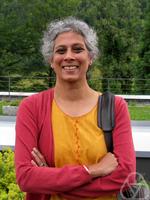
Sujatha Ramdorai is an algebraic number theorist known for her work on Iwasawa theory. She is a professor of mathematics and Canada Research Chair at University of British Columbia, Canada. She was previously a professor at Tata Institute of Fundamental Research.

Birla Institute of Technology & Science, Pilani is a deemed university in Pilani, Rajasthan, India. It focuses primarily on higher education and research in engineering and sciences. BITS Pilani is one of the first six institutes in India to be granted Institute of Eminence status. According to 2012 data, BITS Pilani has an acceptance rate of 1.47%, making it one of the most exclusive technical universities in the world.

Phoolan Prasad is an Indian mathematician who specialised in Partial differential equations, fluid mechanics. He was awarded in 1983 the Shanti Swarup Bhatnagar Prize for Science and Technology, the highest science award in India, in the mathematical sciences category. He is Fellow of all Indian Science Academies: The National Academy of Sciences, India (NASI), Indian Academy of Sciences (IAS) and Indian National Science Academy (INSA).
V Ramgopal Rao is an Indian academic currently serving as the Group Vice Chancellor of Birla Institute of Technology and Science, Pilani for campuses located in Pilani, Dubai, Goa, Hyderabad and Mumbai. He was previously the Director of IIT, Delhi for six years during 2016-2021.
Goverdhan Mehta FNA, FASc, FTWAS, FRS, FRSC is an Indian researcher and scientist.
Priti Shankar was an Indian teacher, researcher, and educationist whose research focused on the areas of compiler design, formal language theory and algorithmic coding theory.
V. Nagaraja is a Professor, Department of Microbiology and Cell Biology, Indian Institute of Science, Bengaluru. He had received his B.Sc. and M.Sc. degrees in the year 1973 and 1975 from the Bangalore University. He completed his Ph.D. in 1981 from Department of Microbiology and Cell Biology at IISc and the work on mycobacteriophage I3 and role of DNA gyrase in mycobacteria set the stage for his later work when he joined the Institute as an assistant professor in 1989. After his PhD in 1981, he was a research associate at Biozentrum, University of Basel, Switzerland (1981–85) and at Department of Biology, University of Rochester, USA(1985–89). He joined in 1989 as an assistant professor, in Centre for Genetic Engineering, IISc and was involved in setting up of the department. He became an associate professor in 1995 at Department of Microbiology and Cell Biology, IISc, Professor in 2000 and served as professor and chairman of the department (2008–2013). He has been appointed president of Jawaharlal Nehru Centre for Advanced Scientific Research (JNCASR) by the Cabinet Committee on Appointments with effect from 14 October 2015.
Ravishankar Narayanan is an Indian materials engineer and a professor at the Materials Research Centre of the Indian Institute of Science. He is known for his studies on Nanostructured Materials and is an elected fellow of the Indian Academy of Sciences. The Council of Scientific and Industrial Research, the apex agency of the Government of India for scientific research, awarded him the Shanti Swarup Bhatnagar Prize for Science and Technology, one of the highest Indian science awards for his contributions to Engineering Sciences in 2012.
Ganesh Nagaraju is an Indian biochemist, geneticist, cancer biologist and a full professor at the Department of Biochemistry of the Indian Institute of Science. He has been studying DNA damage responses in mammalian cells, and mechanisms underlying chromosome instability genetic diseases and cancer. The Department of Biotechnology of the Government of India awarded him the National Bioscience Award for Career Development, for his contributions to biosciences, in 2015. In 2018, Nagaraju received the Shanti Swarup Bhatnagar Prize for Science and Technology in Biological Sciences from CSIR. This award is given in recognition of outstanding contributions to Science and Technology, and is considered one of the highest awards for science in India.
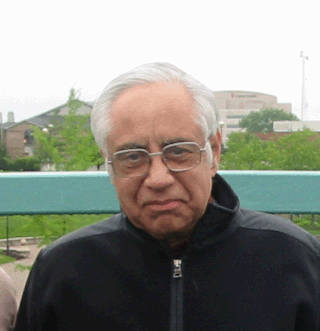
Anil Kumar is an Indian experimental physicist known for his work in the field of nuclear magnetic resonance spectroscopy. He is a professor at the Indian Institute of Science in Bangalore.
Apoorva Khare is an Indian mathematician who works in matrix positivity and analysis, combinatorics and discrete mathematics, and representation theory. He was awarded the Shanti Swarup Bhatnagar Prize for Science and Technology, the highest science award in India, for the year 2022 in Mathematical Sciences.
